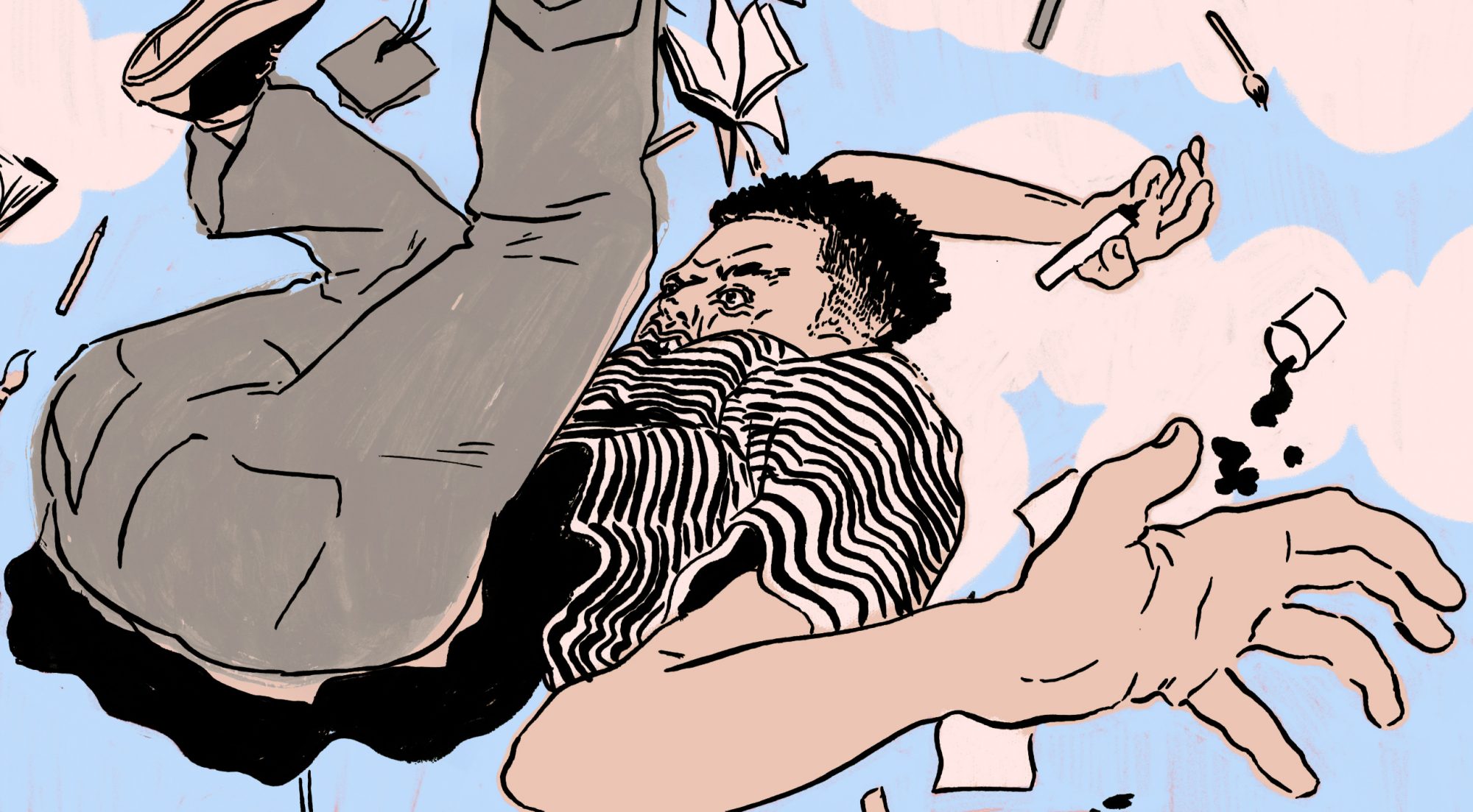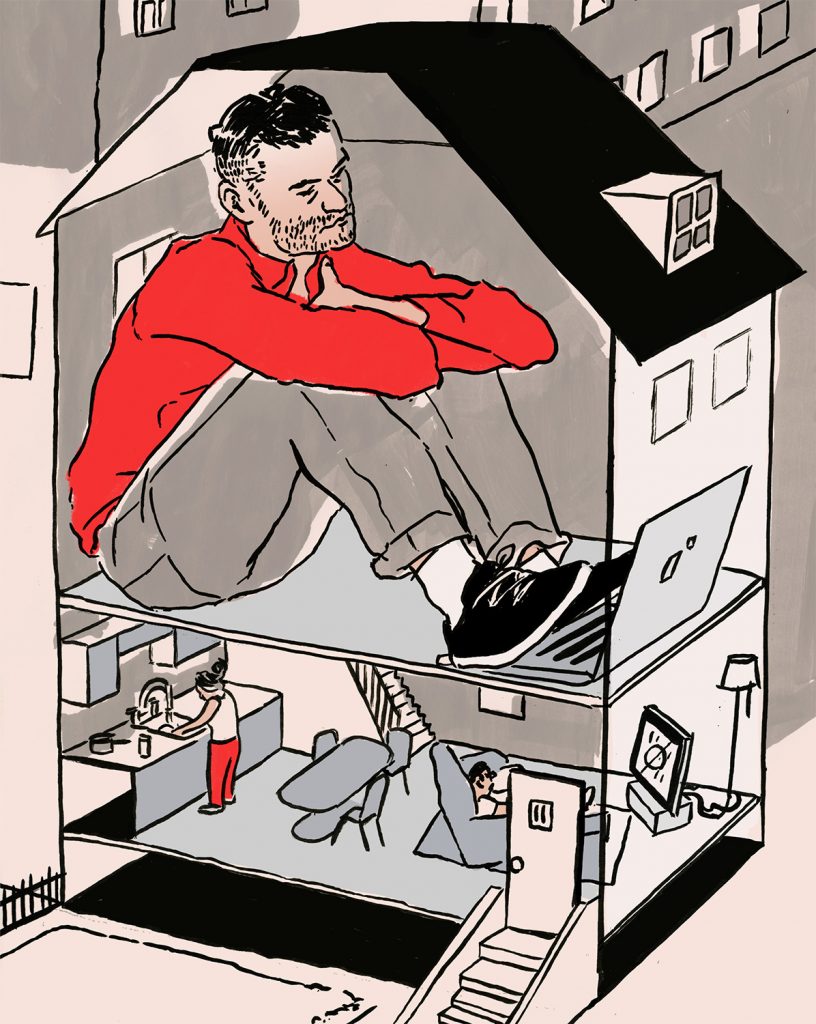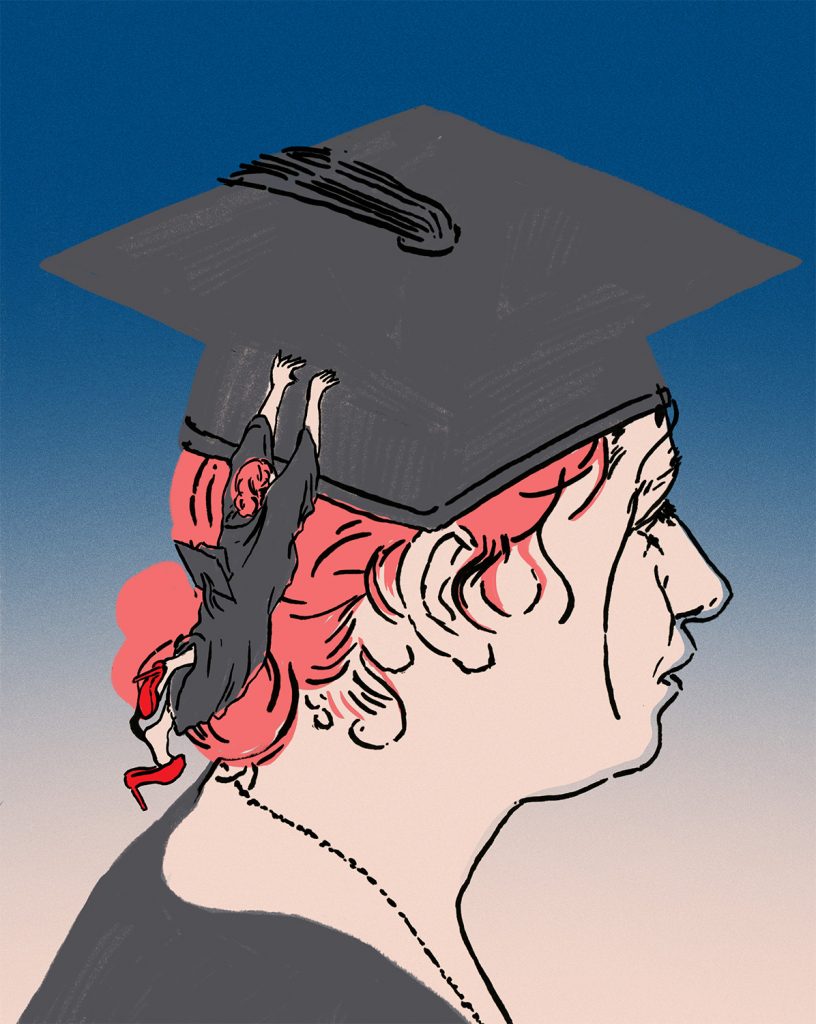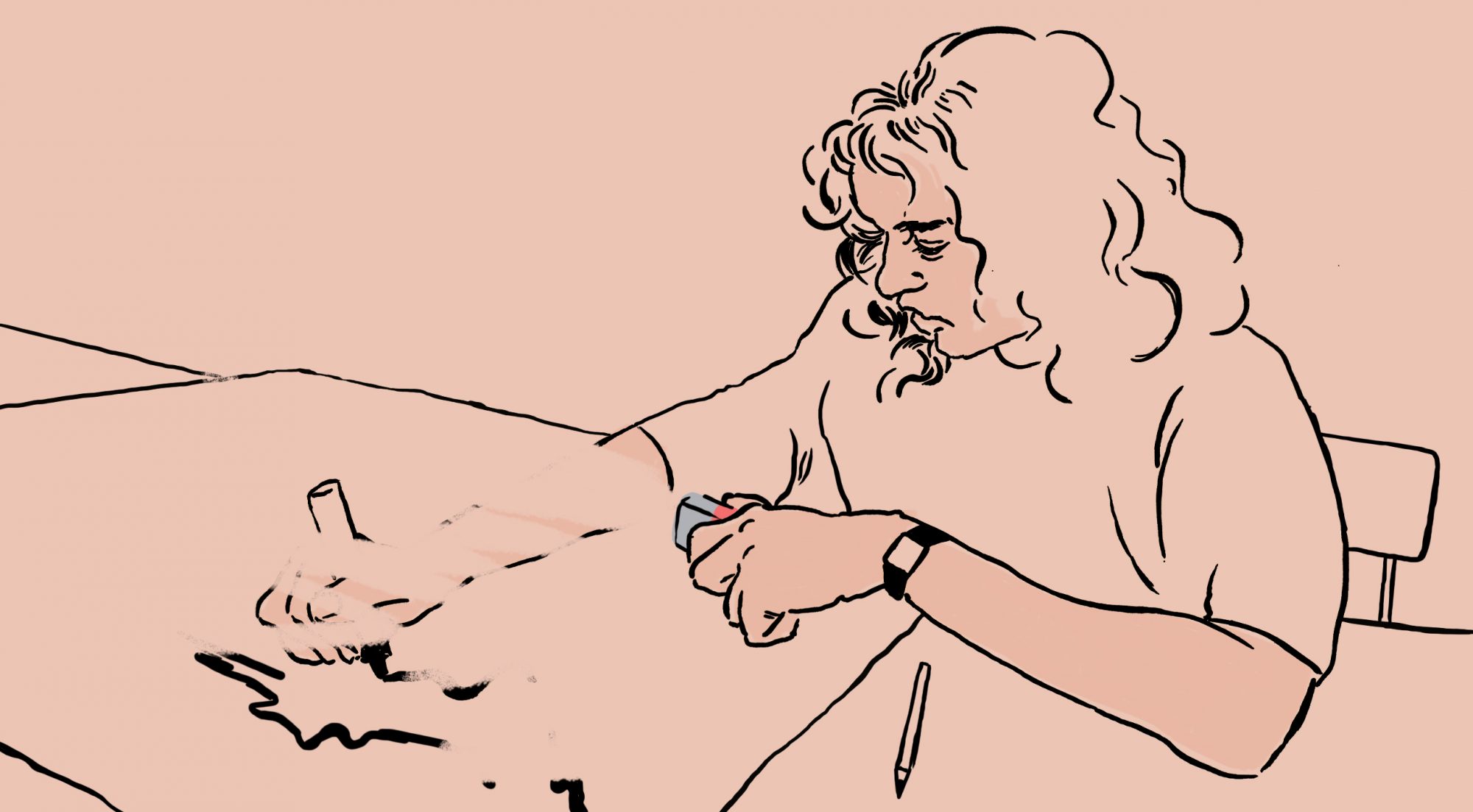
Epic Fail
Laura Gordon explains why failure is vitally important for creativity and why education's framing of it is deeply counter-intuitive
Words by Laura Gordon
Illustration by Calum Heath
My fear of failure obsession is largely autobiographical. Although thankfully it takes people a while to work this out. The lightbulb moment occurred when I was babysitting my 9-year-old next door neighbour and helping with her spelling homework. The task was -es and -oes plural word endings, and she was working through the list quietly until she hit ‘flamingo’. She asked me whether it’s spelt ‘flamingos’ or ‘flamingoes’ and I said I had no idea because I’d never written it down. I suggested that she guess the answer and that if she got it wrong, she’d probably remember it forever. She looked at me with horror and said she had to get more than 7 out of 10 on average across the term, so she couldn’t afford to get it wrong. This went against everything I knew about how we learn. The learning task had been hijacked by the not-failing task.
The flamingo experience was compounded by finding the work of Ken Robinson – in particular, his book ‘The Element’ and the most watched TED talk ever ‘Are Schools Killing Creativity’. He positions the possibility of failure [ie. risk] as an integral part of the creative process, and criticises grade-focused education systems for failing to equip young people with the creative skills they need for work in the 21st century. This fear of failure fascination underpinned a large part of my research and practice on my MA in Visual Communication, taking the shape of a series of workshops with schools across London titled ‘Elastic Octopus: Fear of Failure in Creative Education’. The workshops were designed to get secondary and sixth form students to open up about their own experiences of fear of failure and to create spaces for more risky and experimental ways of working within art and design classrooms. But this phenomenon is not restricted to teenagers. The unpleasant realisation of the project was finding how the anxieties and behaviours of these teenagers were mirrored in myself and my peers at both BA and MA level. While the focus on the holy grail of ‘the exam’ may lessen, the same damaging patterns manifest throughout the education system, and often follow students into the world of work.
In order to understand how fear of failure affects us beyond the school gates, I’ve enlisted a multimedia research strategy [bothering people on WhatsApp, Instagram and at the pub] to survey students, graduates and fellow young-ish creatives about what their own versions of fear of failure look like. From stylists to writers, and typographers to tattooists, strikingly similar themes were evident across disciplines, given shape and colour by the specificities of the discipline, career-stage and broader life experience. Whether we like it or not, when we talk about education or work, we’re bringing our messy life stories with us – often stories about what success and failure look like in your family or friendship group.
Fear of failure was a common state of affairs during my BA in Graphic Design. I remember turning up to crits with no idea if what I was presenting was the best or worst piece of work I’d ever done – blindly guessing at what the tutors wanted. Between any cohort of students and tutors, a definition begins to emerge of what type of work is good, and what type of work is not good. We then pass judgement accordingly, whether in crits or the unspoken hierarchy of the year group. The pressure of working within these [often narrow] definitions came up repeatedly when talking fear of failure with current students or recent graduates, particularly in relation to people working outside of these boundaries. These definitions can also be reinforced by professional practice programmes that hold up singular versions of what success looks like. Universities would do better to showcase wider models of practice – people who love big clients and people who hate big clients, people who work for others and people who work for themselves, people who make loads of money and people who make no money at all, people who work 9-5 and people who have 9 jobs, people who call themselves <insert job title here> and people who don’t.
The university retains echoes of the school system which induced fear of failure in our younger selves. The UK education system is one of the most test-based in Europe and defines students by their grades from a very early age. The negative impact of this so-called ‘exam factory’ mentality on children’s mental health is well documented, with huge numbers of school kids suffering from anxiety and depression exacerbated by the exam-based system. In theory, by the time you get to a creative degree at university, this no longer matters – you’re told that ‘your grades don’t matter, it’s all about you and your portfolio’. While this can be liberating [and in my experience entirely true] we’re expecting students to discard a story about success they’ve been told since they took their first exams aged 6 or 7. Rather than saying ‘feel the fear and do it anyway’ we need to reframe what failure and success look like. My Elastic Octopus research showed that the students most affected by fear of failure at school were high-achieving girls – and this is borne out by the graduates I spoke to who were most concerned about their grades. We can probably expand ‘grades’ here to mean ‘validation by the institution’. For some this anxiety coalesces around results day, knowing that the students who received a 1st will likely be sharing on social media how they’re ‘so glad all their hard work paid off’. This has made unavoidable something that was previously kept quiet. When I graduated from my BA in pre-Instagram 2012 I had almost no idea of who got what.
For many, graduating can be peak fear of failure. There’s so much in play at all once – How do I find a job when I don’t know anyone yet? What job do I even want to do? If you’re lucky enough to be able to move into your parents’ house… how do I move out? Who am I?
Recent graduates I spoke with discussed being hyper-aware of how everybody else’s job hunts were going and the inevitable comparison to yourself. They spoke of the pressure to find a job quickly – often within a couple of months of graduating, mimicking the back-to-school September calendar that feels so familiar. Even more important than the timeline is the pressure to find THE job – which in practice means ‘being a “graphic designer” who works for a trendy Instagram famous studio’. The idea of finding THE job within three months of graduating is absurd. It would be like spending the rest of your life with your first girl/boyfriend in the sense that it can happen but is the exception and not the rule. As in relationships – you might need to learn what’s out there and make some mistakes in order to work out what you do want. Perhaps the idea of THE job is problematic full stop – this will inevitably change as you evolve as a practitioner.
This fear of failure about getting the wrong job, too slowly, is compounded by family pressures, both real and imagined and finding work that’s ‘easy to explain as a good job to the parents’ is a common concern. However well-meaning, it’s helpful to remember that your family may have a very different understanding of how work works – a lot may have changed since they entered the workplace. For students lucky enough to move home after graduation, fear of failure resides in how long it might take you to move back out – to be ‘a real adult’ at last. Combine this with the financial pressures of often unpaid or lowly paid entry positions, huge student debt and high costs of living and this can feel like a very high stakes game.
But enough doom and gloom. Those months after graduation are a one-off, and they should be set up as a space for exploration and experiments rather than a race to be completed as quickly as possible. Graduating is difficult by necessity – it’s a big transition between life stages and the end of structures and rules that have defined our lives up to this point.


The most universal fear of failure theme that came up across the students, graduates and practitioners that I spoke with was about ‘not being good enough’. This lack of confidence was notable across the board, from students who avoided applying to the studios they wanted because they thought their portfolios weren’t good enough, to established practitioners feeling physically sick about not meeting others’ creative expectations. This workplace fear of failure could be broadly characterised as imposter syndrome – feeling like you’re absolutely winging it and it’s just a matter of time until you get found out. Imposter syndrome is more prevalent in the creative industries than any other field and I would wager this is due in part to the subjectivity of creative practice, where there isn’t often a ‘right’ answer and living with that uncertainty is part of the job. Imposter syndrome is also known to be more common in women – so a double whammy for creative ladies. The flavours of ‘not good enough’ ranged from the technical ‘not feeling like you are a “real” designer skills because you don’t know how to typeset or know all the InDesign shortcuts’, to the interpersonal ‘I’m massively scared of disappointing people I admire/are above me in a job/my peers’, the creative quality of the work ‘the fear of not delivering an input that is really fresh, exciting and creative’ to self-confidence ‘scared to speak up fully or putting everything on the table’ or ‘feeling vulnerable when you present a concept of your own to a client’ and impossible expectations ‘fear of not surpassing expectations [which I’ve somehow convinced myself I have to do every time]’.
I’m not advocating 100% self-belief here [nobody likes that person] but many people who reported feeling like this regularly were also highly aware of how destructive this level of self-criticality can be. How it can lead to overwork and exhaustion, and how these fears can ruin an experience or detract from something otherwise positive. While some pressure can be a helpful conduit for creativity, extreme fear of failure often hampers our ability to embrace risk and experimentation. The creative task is hijacked by the not-failing task.
I asked students, graduates and practitioners alike to share any strategies or advice they have for managing fear of failure that might be helpful for others. Thank you to all of them for being so open and sharing their vulnerabilities with me – I feel much better knowing that I’m in good company. Now for their words of wisdom.
Share alike care alike. Everyone else is probably feeling the same as you. Rather than everybody pretending that they’re absolutely smashing it, be honest and open with each other about your fears. At the same time ‘understand that we all have a different reaction to fear and failure and this must be respected’.
Share the load. Schedule mid-points in projects to informally show work, rather than just high-pressure presentation setups. Share work or pitches with friends you trust for feedback until it feels less scary.
Invite failure in. ‘Insert failure into your design brief. Block out time for it if need be. We must reclaim failure from the hands of our anxieties and welcome it into our creative process’. Make a ‘Play’ folder before you move into the ‘Design’ folder, or a Version 0 of your file to keep the pressure off and reduce the temptation to play it safe.
Quantity not quality. In my original Elastic Octopus research, I came across an experiment where two groups of students were tasked with making clay pots. The first group was told to make the best pot they could, the second group was told to use as much clay as possible. The second group has been liberated from the one shot pressure of a making a ‘good’ pot and as a result, made much more interesting and experimental pots. I find a quick-fire quantity-led process a helpful way to take your eye off the outcome prize.
Let it simmer. ‘Most creative ideas ‘fail’ before they get off the ground because of our tendency to over rationalise and justify their existence before they even exist. It’s ok to feel protective or secretive over something if you’re not quite ready to talk about it at the beginning, you don’t always have to show that you’re working on something to everyone to seem productive and creative. Only when you’ve established an idea, and there’s something material to work with – or against – should you open yourself to being influenced by external things or starting that comparison phase.’
Spread the risk. ‘Having multiple strands of practice helps; even if one area of work isn’t going well, another will probably offset that’. Accept that some projects will be more creatively demanding than others ‘three years into my practice, I choose my occasions to be the most creative I can be, and welcome work that is more straightforward as it costs me less time and energy’.
Worst case scenario. ‘Once I say it out loud it somehow sounds less scary than in my head.’ It can help to take it from the abstract to the tangible, so rather than ‘I’m not creative enough and I’ll never produce anything of value’ the fear becomes ‘this client might not contact me again about their next project’.
Work through failure. You will fail at some point, it’s inevitable, and much of what we learn, however painful comes from our failures or mistakes. ‘Keep on working after you’ve failed. Failing once is not proof enough, you need more statistical evidence before writing yourself off as a failure. The 2nd or 3rd or 10th try might work and that experience will reprogram your brain to start thinking you are capable again.’
You are more than your work. ‘If you work your arse off, people notice. It doesn’t matter if you don’t succeed or come out with something amazing, even if you take a giant risk and it goes horribly wrong there’ll be enough who know that you’re a grafter and will have your back.’
Keep the faith. Whether at the start – ‘To stay positive I try to remind myself that the best things take time to nurture and grow, so I’ve got to keep “planting seeds” everywhere. Keep my brain stimulated, talk to anyone and everyone about your interests and theirs – you never know what might come up.’ Or a couple of years in – ‘I used to feel a sense of worry about not really knowing what my style was and simply not being good enough. I’ve found a sense of peace from accepting that it takes time and it’s a process.’
Go your own way. ‘Racking up five internships before your graduate summer is even over isn’t the only way to succeed, and having slow days is healthy, it isn’t failure. It just depends on how you work best. I get more work done doing three days freelance rather than the five full days I tried working at an agency.’ Exiting the set pathway might initially feel like a failure but ‘no journey is the same, so trying to follow or imitate someone else’s success might disappoint.’
Ultimately ‘find a measure of success which satisfies you’.

Epic Fail is part of our new independent editorial series ‘The Crit’ which assesses the state of creative education from a variety of perspectives. The intention of the series is to instigate conversations that can open up clearer lines of communication between students, educators, institutions, graduates and industry. We want to improve transparency, empathy and dialogue between the key stakeholders because we believe wholeheartedly in the value of creativity and want to support those who teach and learn it alike. This feature is written by the brilliant Laura Gordon and illustrated expertly by Calum Heath, we’ve been looking for a way to work with them for a long time now and are thrilled to have brought them together for this piece.









